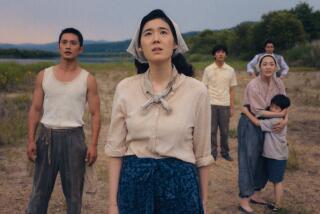TV Reviews : A Gently Moving, Image-Laden ‘Summer Winds’
- Share via
“Hot Summer Winds,” the story of a struggling Japanese-American family working a vegetable patch in the Salinas Valley in 1934, is as fragile as a haiku poem.
In fact, this drama, produced by KCET for “American Playhouse” (tonight at 9 on Channel 28, Friday at 9 p.m. on Channel 15), is based on two short stories in the haiku-inspired anthology, “Seventeen Syllables,” by Hisaye Yamamoto, who is a major voice among Japanese-American authors of short fiction.
The drama is timely because it echoes the changes and readjustments that await present-day immigrants to California. By spotlighting Japanese-American life in California in the Depression, rooted in small truck farms in the Central Valley, the production sets the record straight and anticipates the specter of relocation camps that fell a few years later on people like this family.
Lensing in the bucolic San Juan Bautista in the Salinas Valley, director-adaptor Emiko Omori’s tone is quiet and tremulous, capturing with few words the marital mismatch between an educated woman who sends haiku poetry to a Japanese-American newspaper and a traditional, illiterate farmer who grunts a lot and grows furious at his wife’s aspirations and his children’s Americanized ways.
The mother and father are strongly played by the luminous Natsuko Ohama and the surly Sab Shimono. A key supporting role, and the source of the mother’s sensual revenge and momentary freedom, is her attraction to a charming farm hand, sensitively rendered by Pepe Serna.
What lingers, besides the heartfelt conclusion, is the economy and simplicity of the piece--literally the wedding of an image-laden, 17-syllable haiku poetic form to an hourlong movie.
More to Read
The complete guide to home viewing
Get Screen Gab for everything about the TV shows and streaming movies everyone’s talking about.
You may occasionally receive promotional content from the Los Angeles Times.






